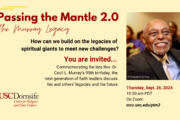The COVID-19 pandemic has impacted not only our physical health, but also our financial health. Stay-at-home orders, which have reduced the number of people infected by the illness, have affected organizations of all sizes, including churches. Even as society begins to reopen, many congregations see no safe way to restart religious services, with churches being one of the highest risks places for contracting COVID-19.
This is the season for new ideas for sustaining congregational finances within the religious sector.
No matter the religious background or denominational affiliation, the financial backbone of congregations has always been donations through consistent giving. Churches traditionally rely on the tithes and offerings of the membership to financially support ministries and various causes. Whether the fundraiser is for scholarships for college tuition or to repair the roof, the first contributors have been the membership.
Even though the methods of financial contributions have expanded from cash to checks to credit cards and online giving, the membership traditionally has brought their contributions to the physical church. Churches have barely gotten used to swiping credit cards during offering time without feeling uncomfortable.
COVID-19 has forced the church to shift overnight the way they receive tithes and offerings. Many churches have had to make immediate upgrades to operations and payment methods to accept online giving. The more popular online giving tools are: Tithely, Givelify, PushPay, PayPal, Zelle, Venmo and CashApp.
The seemingly simple shift to apps and electronic transactions may be difficult for some older and more traditional members. Some churches have mailed out “church envelopes” with the church address. This helps these members stay engaged and not feel ridiculed for not being tech savvy. Other congregations have set aside a time and day to allow members to “drive through” and drop off their offering. This allows members to follow the rule of social distancing while continuing to remain connected to their church.
Yet, even as members are compelled to stay away from church, many of them are also facing economic hardship. As we know from past economic recessions, if the income of the membership is impacted, then the income of the church is impacted as well.
A survey found that only 45 percent of Angelenos remain employed, with an estimated 1.3 million jobs lost in recent months. Even with more people seeking financial independence through entrepreneurship, many have not been able to access the support intended for small businesses.
We can turn to the Bible for advice: “Invest in seven ventures, yes, in eight; you do not know what disaster may come upon the land,” reads Ecclesiastes 11:2. In this season of uncertainty and hardships, scripture instructs us to have seven to eight streams of income. This applies to churches, too.
Here are some short- and long-term examples of what I have seen some churches in the Los Angeles area doing to supplement the drastic decline in tithes and offerings:
- Churches have applied to governmental assistance programs such as the Payment Protection Program and Economic Injury Disaster Loans. Click here for more information on these.
- Churches with parking lot space are renting their lots to nearby apartment complexes since there are fewer available parking spaces on the streets due to rules that compel people to stay at home.
- These same “parking lot” accessible churches are also renting out space to small food preparation businesses that are delivering to the surrounding community.
- Churches are contemplating taking out loans to help them continue to pay the mortgage or salaries rather than drawing on the equity of the church property.
- Lastly, there are churches that have invested an agreed upon amount in the stock market with the hope of helping the finances.
Yes, there are scriptures that direct believers toward financial stability especially to prepare for a time of crisis, but what are churches to do in the midst of a global crisis that will end no time soon?
This crisis creates the opportunity for congregations to radically rethink how they fund themselves to do the work of ministry and be a light unto the world.
Click here for resources for faith communities during the COVID-19 pandemic
Click here for information about the Murray Center’s “Financial Empowerment Through a Crisis” webinars
Click here for personal financial assistance resources during the COVID-19 pandemic
Donald Cook II is a guest contributor with the USC Center for Religion and Civic Culture.






